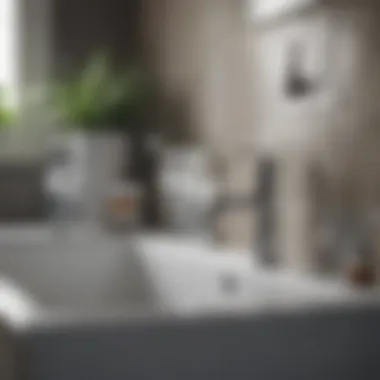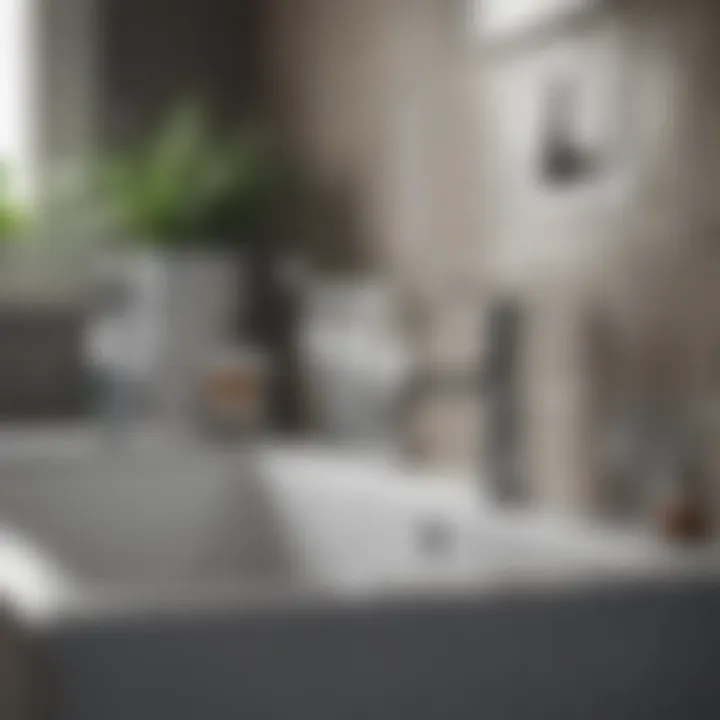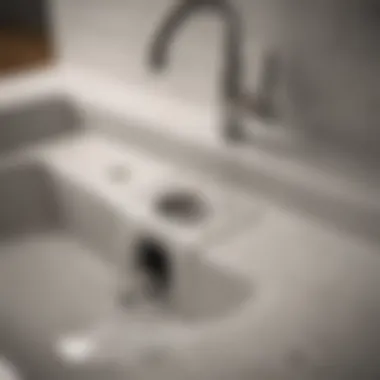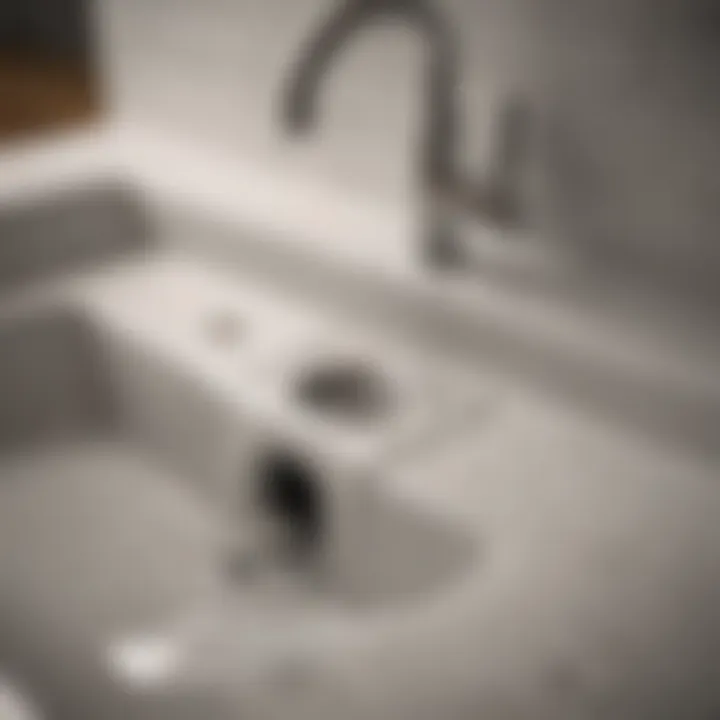Effective Solutions for Clogged Sink Drains


Intro
Dealing with a clogged sink drain is a common yet frustrating experience for homeowners. Understanding the various approaches to resolve this issue can save time and money. The solutions range from chemical treatments to natural remedies, along with specific tools that can facilitate the unclogging process. Furthermore, preventive measures are equally important in maintaining drainage efficiency and avoiding future blockages.
Home Design Inspiration
While the primary focus is on drainage solutions, the aesthetic impact of plumbing cannot be avoided. Consideration of the overall home design can complement the functionality of plumbing systems. A well-designed space not only caters to practical needs but also enhances the appeal of one's living environment.
Incorporating Discreet Plumbing Solutions
In modern interior design, hiding plumbing fixtures becomes a thoughtful design choice. Here are a few ideas:
- Bespoke sink cabinets: Choose cabinetry that conceals pipes and provides storage.
- Integrated sinks: Consider undermount sinks that blend seamlessly into countertops.
- Water-efficient fixtures: Invest in elegant faucets that reduce water flow without sacrificing style.
These options control aesthetics while tackling plumbing issues effectively.
Effective Drain Solutions
Chemical Remedies
Chemicals often provide a quick fix for immediate problems. Popular products include:
- Drano Max Gel: Powerful gel that clings to clogs, breaking them down.
- Zep Clog Zap: Effective against tough clogs, including grease.
However, use caution. These solutions can be harmful to pipes if overused or improperly applied. Always follow safety instructions on packaging.
Natural Solutions
For those seeking environmentally-friendly options, natural remedies are a viable choice. Common methods include:
- Baking soda and vinegar: Pour baking soda followed by vinegar down the drain. Wait 30 minutes, then rinse with hot water.
- Salt and boiling water: A simple method involving salt poured into the drain followed by boiling water helps break down minor blockages.
These methods are safe for pipes and effective for maintaining drain flow.
Preventive Strategies
Keeping drains clear of debris requires regular maintenance. Some key habits to form include:
- Install drain screens: These trap food and hair, preventing clogs from forming.
- Run hot water: Regularly flushing drains with hot water can help dissolve grease buildup.
- Avoid certain dispose practices: Never pour grease, coffee grounds, or large food scraps down the drain.
Staying proactive is crucial in avoiding the time and stress associated with clogged drains.
"Prevention is always better than a cure." - Unknown Author
By integrating this knowledge into a regular maintenance routine, homeowners can ensure a seamless flow in their plumbing.
The End
Grasping the multifaceted approaches to tackling clogged sink drains empowers homeowners to take informed decisions. From utilizing effective chemical resources to embracing natural alternatives, every technique has its place. Coupled with preventive practices, these strategies serve as essential tools in managing and maintaining sink functionality for long-term convenience.
Understanding Clogged Sink Drains
Clogged sink drains are an everyday inconvenience that can lead to more serious plumbing issues if left unattended. Recognizing the significance of this topic is essential for homeowners and design enthusiasts concerned about their plumbing systems. The ability to understand the mechanics behind clogged drains forms the foundation for effective solutions.
Effective insight into clogged drains helps to prevent potential disasters, such as plumbing backups and water damage. Furthermore, maintaining functional drains is crucial for preserving the aesthetics and comfort of living spaces. Investing time in comprehending this issue lays the groundwork for informed decisions about repair and maintenance practices.
Common Causes of Clogs
Clogs in sink drains often arise from a range of common culprits. Hair is a frequent offender; it combines with soap residue and grease, forming stubborn blockages. Similarly, food particles can accumulate in kitchen sinks, particularly when not using strainers.
Other substances also contribute to obstruction:


- Soap residue: Soap builds up over time, inhibiting water flow.
- Oil and grease: These substances solidify in the pipes, creating persistent clogs.
- Foreign objects: Items like utensils, plastic wrappers, or toys can unexpectedly become lodged in the drain.
Being aware of these causes facilitates proactive measures that can prevent clogs before they develop.
Consequences of Neglecting Clogs
Ignoring the signs of a clogged drain can lead to escalating issues. Initially, a slow-draining sink may seem minor, but if left unresolved, it can morph into a much larger problem. Consequences include:
- Water Damage: Water backups can harm cabinetry, flooring, and other structures, leading to costly repairs.
- Foul Odors: Stagnant water and decomposing debris carry unpleasant smells that can permeate living environments.
- Pest Infestations: Blockages create ideal habitats for pests, as food debris can attract unwanted insects and rodents.
"Addressing clogged sinks swiftly saves money in the long run, preventing extensive damage and improving overall home hygiene."
Thus, recognizing and addressing the causes of sink clogs promptly ensures that pipe systems function efficiently, maintaining the integrity of one's home.
Chemical Solutions for Drain Clogs
Chemical solutions for clogged drains are common methods used by homeowners and troubleshooting enthusiasts alike. Understanding the advantages and limitations of these solutions is vital in managing the often frustrating problem of a blocked sink. They provide quick relief, especially in situations where time is of the essence.
Commercial Drain Cleaners
Commercial drain cleaners are formulated products specifically designed to break down clogs in sinks. These cleaners usually contain potent chemicals like sodium hydroxide or sulfuric acid, which can effectively dissolve grease and debris causing the blockage.
Benefits of Commercial Drain Cleaners:
- Speed: They typically work quickly, often within minutes.
- Effectiveness: Many are designed to tackle stubborn clogs that may resist other methods.
However, it is crucial to consider the potential downsides.
- Corrosive Nature: The powerful chemicals can damage plumbing if used excessively or improperly.
- Environmental Impact: Many commercial products contain harmful substances that can leach into water systems.
- Health Risks: Safety gear is often needed when handling these products due to the risk of chemical burns or respiratory issues.
Careful reading of labels and adherence to safety guidelines is essential to ensure responsible usage.
Homemade Chemical Solutions
For those looking for a safer and often more environmentally friendly approach, homemade solutions can be advantageous. Common household ingredients can sometimes effectively clear minor clogs.
- Baking Soda and Vinegar: This combination is popular for a reason. The chemical reaction produces fizzing, which can help dislodge debris in pipes.
- Salt and Boiling Water: Another effective method involves using salt.
- Enzyme Cleaners: These cleaners use natural enzymes or bacteria to eat away organic matter in the pipes. They are less hazardous and can be used regularly for preventative maintenance.
- Pour half a cup of baking soda down the drain, followed by half a cup of vinegar.
- Wait for about 15-30 minutes before flushing with hot water.
- Simply pour half a cup of salt into the drain followed by boiling water.
- Let it sit for a bit, and then flush with cold water thoroughly.
- Usually, they need more time to work but are gentler on pipes and the environment.
In summary, both commercial and homemade chemical solutions have their place in maintaining unclogged drains. Knowing when and how to use them can help prolong the lifespan of your plumbing and keep drains flowing smoothly.
Natural Remedies for Drain Issues
Natural remedies for drain issues encompass methods that are environmentally friendly, cost-effective, and accessible for most homeowners. These solutions are increasingly popular as individuals seek alternatives to harsh chemical cleaners that can be detrimental to both plumbing systems and the environment. By using natural methods, users can effectively clear minor clogs, maintain drain health, and contribute to sustainable living practices. Moreover, these techniques often utilize common household items, making them convenient to implement.
Baking Soda and Vinegar Method
One effective natural remedy for unclogging drains is the baking soda and vinegar method. This approach leverages the chemical reaction between these two items to help dislodge stubborn blockages.
To begin, pour a cup of baking soda down the drain. Follow this with a cup of vinegar. The mixture will fizz and bubble, which indicates the reaction is happening. After about 15 minutes, flush the drain with plenty of hot water. This method is particularly useful for breaking down grease and soap residues that typically contribute to clogs.
Salt and Boiling Water Approach
Another simple yet powerful technique is the salt and boiling water approach. This method is straightforward and can be very effective for maintaining clean drains. Start by boiling a pot of water. Once boiling, add half a cup of salt. When the water is ready, pour the salt-water mixture down the drain slowly. The salt aids in loosening debris while the boiling water helps to dislodge any accumulated matter.
This remedy is excellent for preventing build-up from forming, especially in kitchen sinks where food particles and grease can settle over time.


Enzyme-Based Cleaners
Enzyme-based cleaners employ natural enzymes to break down organic materials causing clogs. Unlike traditional chemical cleaners, these products are less harsh and safer for the environment and plumbing systems. Enzyme cleaners can be particularly effective on hair, food waste, and other organic substances that accumulate in drains.
The application process typically involves pouring the product down the drain and allowing it to sit for several hours or overnight, depending on the manufacturer's instructions. This allows the enzymes to digest and break down the matter blocking the drain.
In summary, natural remedies for drain issues provide homeowners with effective and safe options for maintaining their plumbing. Methods like baking soda and vinegar, salt and boiling water, and enzyme-based cleaners not only facilitate drain cleaning but also support sustainable practices. Employing these approaches fosters a healthier environment and can save both time and money.
Physical Tools for Unclogging Drains
Clogged drains can disrupt daily life, causing frustration and inconvenience. When chemical solutions fail to resolve the issue, physical tools become vital options. Utilizing these tools can not only free your drains but also give you a greater understanding of plumbing dynamics. This section will explore various physical tools that are effective in unclogging drains, detailing their usage, benefits, and important considerations.
Plungers
Plungers are one of the most common and essential tools for unclogging sinks. They use suction to dislodge blockages and are particularly effective in sinks and toilets. There are two main types of plungers: cup plungers and flange plungers. The cup plunger is suited for flat surfaces like sink drains, while the flange plunger is designed for toilets.
To use a plunger effectively, ensure there is enough water in the sink to cover the rubber part of the plunger. Create a seal over the drain and push down firmly, followed by a strong pull upwards. This action produces pressure that can push through the clog. Repeating this action several times may be necessary for stubborn clogs.
There are a few key points to keep in mind:
- Ensure the plunger is clean before use to avoid introducing bacteria into the drain.
- A sufficient water level is essential for effective suction.
- Do not use excessive force, as this can damage pipes.
Drain Snakes
Drain snakes, also known as augers, are another valuable tool for tackling more stubborn clogs. Unlike plungers, drain snakes are designed to reach deeper into the plumbing system. They consist of a flexible metal wire with a coiled end that can grasp or break apart clogs.
Using a drain snake involves inserting the coil end into the drain and rotating the handle to navigate through bends in the pipe. As it moves through, it can grab hair, grease, or food particles that may be causing the blockage.
When using this tool, consider the following:
- Always wear gloves, as clogs can be unhygienic.
- Feed the snake slowly to avoid damaging the pipes.
- Remove the snake after usage and clean it properly to ensure longevity.
Wet/Dry Vacuum Usage
A wet/dry vacuum is a powerful and versatile tool for unclogging drains. This device can suck up both solids and liquids, making it particularly useful for larger clogs in sinks and showers. Before using a wet/dry vacuum, make sure it is designed for water suction to avoid damaging the motor.
To employ a wet/dry vacuum, set it to the liquid mode and create a tight seal over the drain. Power the vacuum on, allowing it to pull debris out of the drain. This method can be especially helpful for removing large chunks of material or pooling water.
A few tips when using a wet/dry vacuum include:
- Check the filter regularly; clogged filters can reduce suction power.
- Keep the vacuum’s hose clear to promote better performance.
- Use caution when dealing with hazardous substances, ensuring adequate ventilation and safety gear.
Utilizing physical tools is a direct approach that can often yield immediate results, particularly when chemical methods fail. They provide a hands-on solution that can enhance your plumbing skills and knowledge.
Preventive Measures for Clogged Drains
Preventing clogged drains is essential for maintaining the overall health of your plumbing system. Regular attention to this aspect can save time, money, and effort. Investing in preventive measures ensures that your sinks remain functional and reduces the risk of unexpected plumbing issues. The significance of this section cannot be understated; understanding how to maintain clean drains can alleviate the burden caused by frequent clogs. By embedding sustainable practices in your routine, you contribute positively to the environment as well as your household's integrity.
Regular Maintenance Tips
Regular maintenance is key to preventing sink clogs. Here are some practical tips to incorporate into your home routine:
- Routine Cleaning: Regularly clean drains by flushing hot water through them. This can help dissolve accumulated grease and soap.
- Use Drain Screens: Placing mesh screens over sink drains can catch food particles and debris, keeping them from entering plumbing.
- Routine Inspections: Check under sinks for leaks and monitor for signs of slow drainage. Tackling these issues early is crucial.
- Use Storage Wisely: Avoid overloading nearby areas with heavy items that may inadvertently fall into the sink.
- Regularly Remove Buildup: Every month, consider using a mixture of baking soda and vinegar for a deep clean.
These steps may seem simple; however, they significantly reduce the chances of clogs forming.
What Not to Dispose of in Sinks
Understanding what should not go down the sink is equally vital. Certain substances can create serious issues:
- Grease and Oil: Cooking oils and fats can solidify in pipes, leading to blockages.
- Food Waste: Although some sinks are equipped with disposals, large food scraps can still cause clogs.
- Non-Biodegradable Items: Items like plastic, paper towels, and hygiene products should always be disposed of in trash bins.
- Coffee Grounds: They can form sludge when mixed with water and lead to a clogged drain.
- Chemicals: Harsh chemicals can corrode pipes; always follow disposal guidelines.


"Preventive care is much better than reactive care. Small efforts today can yield big rewards in the future."
By being mindful of what goes down your drain and regularly maintaining them, you can effectively prevent potential clogs. This foresight can preserve the efficiency of your plumbing and enhance your home’s overall condition.
Professional Intervention
In the realm of plumbing, *professional intervention* stands as a pivotal component when dealing with clogged sink drains. While many homeowners may opt for DIY solutions, there are instances where the expertise of a plumber becomes necessary. Understanding when to seek help can save time, money, and potential damage to the plumbing system.
When to Call a Plumber
Determining the right moment to call a plumber is crucial to maintain the functionality of your sink. Here are some indicators that professional assistance is warranted:
- Persistent Clogs: If a clog resists all attempts at removal, it may indicate a deeper issue within the plumbing system.
- Multiple Drains Affected: When drains across a home are slow or clogged simultaneously, it often signals a main sewer line problem.
- Unusual Sounds or Smells: Gurgling sounds or foul odors can suggest that trapped waste is causing issues in the drainage system.
- Water Backup: If wastewater is backing up into other fixtures, it is essential to call a professional promptly to avoid health risks.
Each of these scenarios suggests a complexity beyond typical maintenance. Ignoring such signs may lead to extensive damage and expensive repairs.
Choosing the Right Plumbing Service
Selecting the right plumbing service requires careful consideration. Essential factors to evaluate include:
- Reputation: Look for companies with positive reviews and testimonials to ensure reliability.
- Experience: Opt for services that have dealt with clogged drains specifically, as expertise often correlates with effective solutions.
- Licensing and Insurance: Ensure that the plumber holds necessary licenses and insurance for safety and compliance with local regulations.
- Service Options: Investigate if they offer a range of services, including emergency assistance, which can be vital when urgent situations arise.
When choosing a plumbing service, it may be beneficial to consult with friends, family, or online forums. Websites such as Reddit can provide valuable insights from experiences shared by others.
"A good plumber is worth their weight in gold, especially when your sinks are backing up at the most inconvenient times."
In summary, professional intervention should not be viewed as a last resort, but rather as a proactive measure when needed. An informed approach leads to efficient solutions, preserving not only the plumbing system but also peace of mind in your home.
Environmental Considerations
When dealing with clogged sink drains, it is essential to consider the environmental impact of the solutions employed. The methods used for unclogging not only affect the immediate plumbing systems but also have broader implications for environmental health. Understanding these ramifications can guide homeowners in making more sustainable choices when addressing drainage issues.
Eco-Friendly Drain Solutions
Adopting eco-friendly solutions is crucial for those who aim to minimize the environmental footprint while maintaining their plumbing systems. There are various natural alternatives that can effectively relieve blockages without introducing harmful chemicals into the ecosystem.
- Baking Soda and Vinegar: This combination works through a chemical reaction that can break down organic matter without any toxic residue. The process is simple; pour baking soda down the drain, followed by vinegar. After letting this sit for a while, flush the drain with hot water.
- Salt and Boiling Water: This method involves pouring salt down the drain followed by boiling water. Salt acts as an abrasive material, aiding in the dislodgment of food particles and grease. This technique is particularly effective for lighter clogs.
- Enzyme-Based Cleaners: These cleaners are derived from natural enzymes that digest organic materials. They are safe for plumbing and do not harm the environment. Such products can be particularly helpful for ongoing maintenance to prevent future clogs.
Transitioning to these eco-friendly options not only helps in maintaining healthy plumbing but also contributes to a cleaner environment.
Impact of Chemical Cleaners on Plumbing and Environment
It is important to scrutinize the use of commercial chemical cleaners. While they often provide quick solutions to stubborn clogs, these products come with significant downsides.
- Corrosive Effects: Many of these chemicals contain aggressive compounds that can damage pipes over time, leading to costly repairs and further plumbing issues.
- Toxic Residues: Chemical drain cleaners frequently leave toxic residues that can infiltrate wastewater systems and ultimately harm local water sources. This poses risks to wildlife and disrupts aquatic ecosystems.
- Indoor Pollution: The fumes from such products can also contribute to indoor air quality issues, which may affect the health of occupants in any living space.
In light of these factors, it becomes clear that the satisfaction of immediate results from chemical solutions may not justify their long-term implications. Therefore, seeking alternative methods can significantly benefit both plumbing systems and the environment, aligning proactive maintenance with sustainability goals.
Final Thoughts
In every conversation about home maintenance, the topic of clogged sink drains stands out for its frequent occurrence and potential disruption it can cause. This article has aimed to arm homeowners and design enthusiasts with not only knowledge but practical solutions to manage this common issue. Understanding the essential methods to unclog drains and adopting sustainable practices ensures that the plumbing system operates efficiently, prolonging its lifespan.
Adopting effective practices like regular maintenance, mindful disposal habits, and using eco-friendly solutions can aid in avoiding clogs in the first place. Instead of waiting for a problem to arise, proactivity is key. By implementing a few straightforward strategies, one can save both time and money in the long run.
Summary of Effective Practices
Addressing clogged sinks does not hinge solely on chemical products or traditional methods. Below are various effective practices:
- Use natural remedies like baking soda and vinegar regularly to maintain drain cleanliness.
- Install strainers to catch debris and food particles which may lead to blockages.
- Perform routine check-ups of your plumbing with drain cleaning tools, such as snakes, to prevent buildup.
- Avoid the use of harsh chemicals that can damage pipes over time, impacting both the plumbing and the environment.
By integrating these practices, one can foster a sustainable home environment and enjoy the aesthetics of a well-maintained kitchen or bathroom.
Encouragement for Sustainable Practices
Sustainability should be a central pillar in managing home systems, including plumbing. Often, the methods chosen for rewoving clogs can have long-term consequences on both the environment and plumbing infrastructure. Here are simple yet impactful ways to embrace sustainability:
- Focus on biodegradable products whenever possible. These are less likely to harm ecosystems.
- Explore enzyme-based cleaners which can effectively break down organic materials without causing damage to pipes.
- Consider professional services that utilize eco-friendly methods. Researching options can lead to discovering businesses that prioritize green solutions.
By being conscious of the choices made in dealing with clogged sinks, one contributes to a larger movement towards environmental responsibility. Understanding the relevance of this in everyday life can motivate more individuals to consider their own habits and how to improve them.







